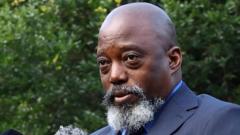The Democratic Republic of Congo's senate has lifted Joseph Kabila's immunity, paving the way for what could become a high-stakes trial concerning accusations of treason and war crimes linked to his alleged support for the M23 rebel group in the eastern region of the country.
Former DR Congo President Joseph Kabila Faces Treason Charges

Former DR Congo President Joseph Kabila Faces Treason Charges
Senate votes to strip Kabila of immunity, opening door for prosecution over alleged support for rebels.
The Democratic Republic of Congo's senate has officially stripped former President Joseph Kabila of his legal immunity, a decisive move that facilitates his prosecution regarding accusations of treason and war crimes. This decision arises from alleged support for the M23 rebel group, which has recently gained control of several towns in the mineral-rich eastern part of the nation.
On Thursday, nearly 90 senators voted in favor of lifting Kabila's immunity, while only five opposed the resolution. Senate Speaker Jean-Michel Sama Lukonde announced the decision, noting a substantial body of evidence linking Kabila to the insurgents. Kabila, who served as president from 2001 to 2019, has previously denied any direct connection to the rebels but has not commented on the latest allegations.
The former leader has lived abroad in South Africa for the past two years but expressed intentions to return to DR Congo last month to assist in resolving the ongoing conflict. However, the claims of his return to Goma, which has been under M23 control, were refuted by his political party, the People's Party for Reconstruction and Democracy (PPRD), which has been banned by authorities due to its perceived complicity in the ongoing conflict.
Justice Minister Mutamba has called for Kabila to return to the country to face trial, asserting that the government is prepared to seize his assets. Analysts suggest that Kabila's prosecution could further destabilize a nation already grappling with a persistent M23 insurgency since 2012. His party has labeled the prosecution a distraction from more pressing issues facing the Congolese populace.
Kabila initially assumed power following the assassination of his father in 2001. Although he supported President Felix Tshisekedi's rise, their relations soured, leading to a fallout in political collaboration. Presently, Kabila’s party retains significant influence, which could pose challenges to Tshisekedi's presidency.
Recent events indicate that the conflict in Eastern DR Congo, which has forced hundreds of thousands of civilians to flee their homes, may be inching towards resolution, as both DR Congo and Rwanda have engaged in discussions to formalize a peace agreement. Meanwhile, the tension between the M23 rebels and the Congolese army remains ongoing.
On Thursday, nearly 90 senators voted in favor of lifting Kabila's immunity, while only five opposed the resolution. Senate Speaker Jean-Michel Sama Lukonde announced the decision, noting a substantial body of evidence linking Kabila to the insurgents. Kabila, who served as president from 2001 to 2019, has previously denied any direct connection to the rebels but has not commented on the latest allegations.
The former leader has lived abroad in South Africa for the past two years but expressed intentions to return to DR Congo last month to assist in resolving the ongoing conflict. However, the claims of his return to Goma, which has been under M23 control, were refuted by his political party, the People's Party for Reconstruction and Democracy (PPRD), which has been banned by authorities due to its perceived complicity in the ongoing conflict.
Justice Minister Mutamba has called for Kabila to return to the country to face trial, asserting that the government is prepared to seize his assets. Analysts suggest that Kabila's prosecution could further destabilize a nation already grappling with a persistent M23 insurgency since 2012. His party has labeled the prosecution a distraction from more pressing issues facing the Congolese populace.
Kabila initially assumed power following the assassination of his father in 2001. Although he supported President Felix Tshisekedi's rise, their relations soured, leading to a fallout in political collaboration. Presently, Kabila’s party retains significant influence, which could pose challenges to Tshisekedi's presidency.
Recent events indicate that the conflict in Eastern DR Congo, which has forced hundreds of thousands of civilians to flee their homes, may be inching towards resolution, as both DR Congo and Rwanda have engaged in discussions to formalize a peace agreement. Meanwhile, the tension between the M23 rebels and the Congolese army remains ongoing.





















